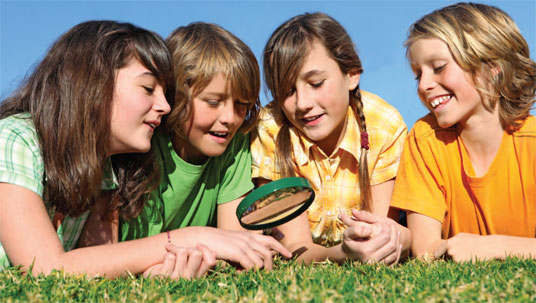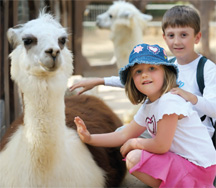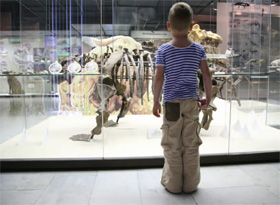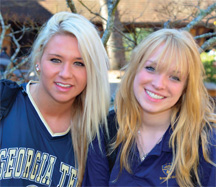Experiential Learning
A Hands-On Approach to Education
by Daniel Beauregard

When many of us hear the words "school" or "education," our minds
immediately conjure a familiar image: that of a traditional classroom, with rows of young students burying their noses in textbooks or scribbling notes as the teacher writes on a chalkboard. While classroom instruction remains a staple of the educational experience, it is enhanced more and more these days by a direct, hands-on teaching approach known as experiential learning.Experiential learning emphasizes the application of knowledge gained by observation and interaction—in short, learning by experience. Many Atlanta-area schools incorporate aspects of this approach into their lessons. A number of schools, such as Chrysalis Experiential Academy and The Museum School, build their entire curricula around the experiential model.
Real-World Interaction
 Experiential learning isn't new; it traces its roots to ways of thinking developed during the Age of Enlightenment. The method engages students in the process of learning, using reason and logic to solve problems. Like the scientific method, experiential learning aims to provide students with the tools to discover the answers for themselves.
Experiential learning isn't new; it traces its roots to ways of thinking developed during the Age of Enlightenment. The method engages students in the process of learning, using reason and logic to solve problems. Like the scientific method, experiential learning aims to provide students with the tools to discover the answers for themselves.One of the most common forms of experiential learning is the field trip, in which students learn about art and art history by visiting a museum, or explore wildlife by visiting a zoo. Each spring, the entire sixth grade class at The Galloway School in Atlanta visits Nancy Creek, observing fish, testing water quality and even using their math skills to measure the height of nearby trees.
Many students don't even have to leave the school grounds to observe nature in action. At High Meadows School in Roswell, students observe a variety of animals on the school's wooded 40-acre campus, where they also learn about ecology and the environment through such features as a compost bin, a nature trail, a wildlife shelter, a sundial and vegetable and herb gardens.
Students at the DeKalb Academy of Technology & Environment in Stone Mountain use a school garden to learn what kinds of plants can be grown in the local climate and to grow produce that is used at the school. And students at Atlanta's Brandon Hall School collect plants along the Chattahoochee River, which happens to run right next to the campus.
But experiential learning isn't just limited to interacting with nature. The method also allows students to learn about technology and finance and develop valuable skills. When Chrysalis Experiential Academy in Roswell opened its doors 10 years ago, there were no computers provided for the students. Instead, "Our kids built every single computer from scratch," says Richard Becker, the school's founder and director.
 This enabled them to learn about the machines from the inside-out, rather than just how to use a word-processing program or access the Internet. Students even started their own computer-repair business, Geeks Get It Done, which acts as the school's I.T. staff. Chrysalis students use the skills they've learned to run several other school-based businesses, as well.
This enabled them to learn about the machines from the inside-out, rather than just how to use a word-processing program or access the Internet. Students even started their own computer-repair business, Geeks Get It Done, which acts as the school's I.T. staff. Chrysalis students use the skills they've learned to run several other school-based businesses, as well."That is the authentic, applied use of experiential learning," says Becker.
The experiential learning approach can also allow children to interact with and learn more about their own community and the world at large. Students at Brandon Hall, for example, volunteer with groups like the American Cancer Association. And one group of students recently traveled to Italy and Greece, where they studied the local architecture to see how geometry was used in the construction of buildings, gaining a deeper understanding of how it's applied to everyday life around the world.
The Museum School, a charter school in Avondale Estates, partners with local museums and other organizations to let students take part in real-world projects and be mentored by experts in different fields.
"At the end of each nine-week period, the school becomes a museum," says Principal Katherine Kelbaugh. "Students … display their projects and actually verbalize their learning."
A Flexible Curriculum
 In truth, there are as many different ways of applying the experiential method as there are schools that employ it. One of the only constants, it seems, is a certain amount of flexibility on the part of the school.
In truth, there are as many different ways of applying the experiential method as there are schools that employ it. One of the only constants, it seems, is a certain amount of flexibility on the part of the school.A key part of that adaptability is a relatively small student body, which allows educators to change the curriculum and tailor it to their students' needs and interests.
Karen Vaught, Brandon Hall's middle school director, says her biggest class consists of five students, allowing her to be fully committed to each child's success. If a student isn't learning the material, she says, it's up to her to present it in a different way. With approximately 140 students, Brandon Hall is able to implement new ideas much more quickly than a bigger school.
"Since we're not bogged down by large numbers, when we come up with an idea that's very interactive for our students, the one thing we don't have to worry about is how to put it together logistically," says Dr. Merridee Michelsen, the school's assistant headmaster and director of academics.
Measuring Success
 Just as there are many ways of applying experiential learning, there's also more than one way to judge its success.
Just as there are many ways of applying experiential learning, there's also more than one way to judge its success.Despite having only been in operation for a year, 100 percent of The Museum School's third graders met or exceeded state standards in reading/language arts and science during CRCT testing, says Kelbaugh.
While test scores are an important part of measuring success, Michelsen says they're only one of the ways Brandon Hall determines if a child has grasped the material. "There are students who have great powers of application but don't do well on a standardized test," she says.
Fittingly, perhaps the best way to gauge experiential learning's impact on a student is through direct experience. "You can see on their faces," says Karen Vaught, "the second they get a concept they were struggling with."
FOR MORE INFORMATION
Brandon Hall
www.brandonhall.org
Chrysalis Experiential Academy
www.chrysalisexp.org
DeKalb Academy of Technology & Environment
www.dekalbacademy.org
The Galloway School
www.gallowayschool.org
High Meadows School
www.highmeadows.org
The Museum School
www.themuseumschool.org







